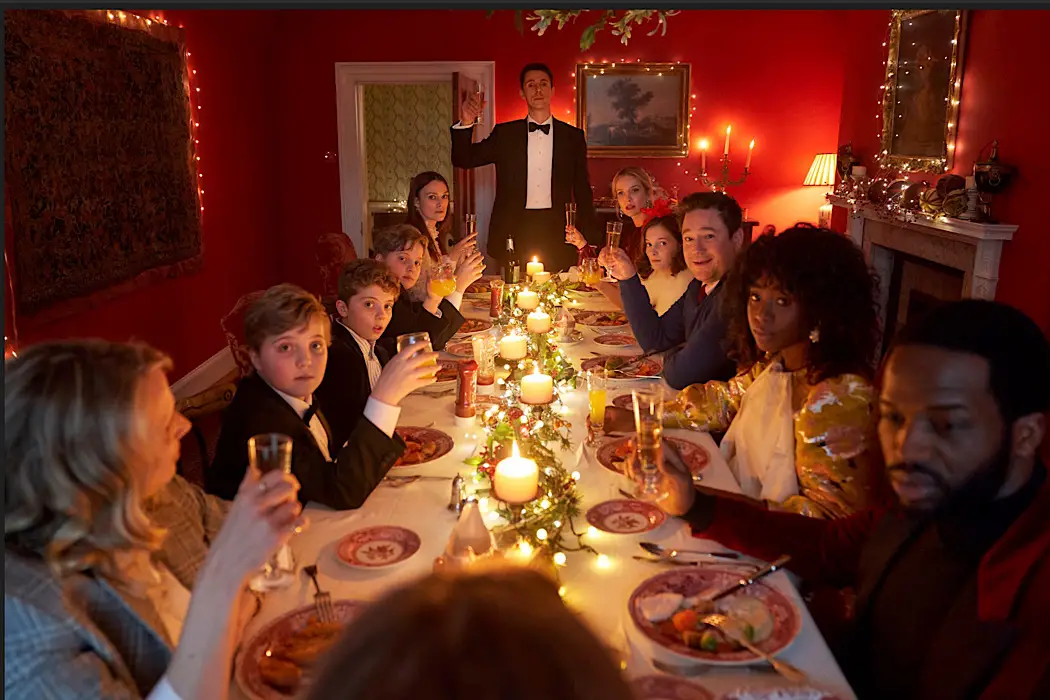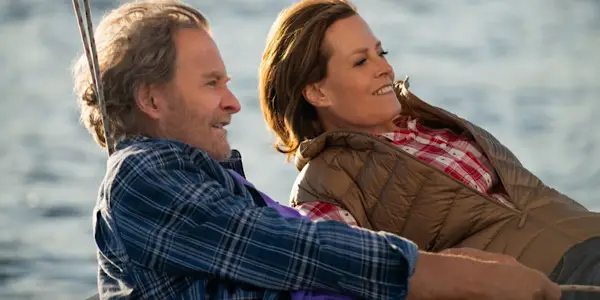TIFF 2021 Report 4: ZALAVA, SUNDOWN, THE GOOD HOUSE & SILENT NIGHT

Kristy Strouse is the Owner/Editor in Chief of Film Inquiry,…
The 2021 Toronto International Film Festival has come to an end, and my first experience with this festival was nothing short of amazing. I’m grateful for how many films I was able to see, and as I do everyday living this life, I’m blown away by the talent involved. With my last report, I finish up with four very different movies, each tackle human emotion in various ways, often finding commonality in understanding and the fear of mortality.
Zalava (Arsalan Amiri)

For a midnight madness pick, this film seemed like a surprising choice. The movie really touches on the idea of paranoia and fear and the lengths that people will go in response to it.
Zalava follows sergeant Masoud (Navid Pourfaraj), who goes to the town of Zalava after reports of a demon. The town is filled with superstitions and history, making most who reside there quite insistent on their beliefs. Masoud is skeptical, and when the local exorcist/shaman, Amardan (Pouria Rahimi Sam) claims to have rid the house that was possessed of its demon, he arrests him for fooling the townspeople.
Rather than a normal demon/possession movie, Zalava studies its characters and the behavior of the titular town under a microscope.
What arises from there is a mix of taut speculation and dissection of human behavior. Masoud doesn’t believe it is real and even considers opening the jar that contains the “demon.” Would you? Would you believe others when they say it is real?
Some of the rationalizations here aren’t that far-fetched in comparison to wild claims others make in real life. In that way, Zalava proves to be more terrifying than any potential visual representation that could have arrived in the film. I dare anyone to watch the film and not wonder about their own reactions given the situation. I think that’s what works so well about the movie, is that it creates unease from a place of realism; even if there’s a minute chance it’s real, do you take it?
There’s also an underlying uncertainty that permeates the film. Where is this going? Is there a demon, is there not? Are you the skeptic or the believer? But also, does it really matter what the truth is? How people respond and the depth of how much fear can drive someone is really what’s explored. The screenplay plays out as an examination of this, instilling discomfort in its audience by showing the desperation of its characters.
It’s an atmospheric picture, that feels wholly focused in its intent and the mood that it is shooting for. Arsalan Amiri is skilled in his direction, aiming for less is more, and allegory over sensationalism. It’s an unexpected, but gripping take on the genre. While it wasn’t what I thought going in, I was happier going out.
Sundown (Michel Franco)

Sundown is one of the few films that I have seen that I still completely can’t land on. What’s created is so disconcerting, and downright irritating (intentionally I believe) for a while, that it makes it challenging to completely judge. I feel partially betrayed and yet I’m admirable of what was done here because it does eventually give you answers if you’re willing to hold on for them.
When we start, we see Neil (Tim Roth) and Alice (Charlotte Gainsbourg) and her teenaged son and daughter, on a luxurious family vacation in Mexico. The joyful ambiance is halted fast when she receives a call that her mother has died and they have to return to the US. At the airport, Neil discovers he has forgotten his passport. This creates the first divide, of many, when the remainder fly home, and he goes back to retrieve it.
Except, he doesn’t.
Instead, he decides to park himself at the beach, beer in hand, renting a small room near Acapulco. He meets a beautiful local Berenice (Iazua Larios), enjoys the sunshine, and either ignores phone calls or is blatantly lying about his circumstances. Neil is searching for something, by really- looking nowhere at all – but whether its peace of escape isn’t clear. Perhaps a bit of both.
He doesn’t sound all too likable right? That’s because Tim Roth manages to embody this character wholeheartedly, underlining Roth‘s impressive skill. You don’t feel sympathy for him, even though you get a sense that something is going on, that an underlying crisis exists. Still, despite this, you watch him go through these actions with a sense of resentment. I do think that this changes as the movie gets more lived in, and things unfold. Roth barely speaks, though finds his voice more as things progress, and his seemingly obtuse behavior runs the line between disconnected and discontented.
As the sun-soaked scenery starts to seep into our character, there is a wave of change, and as the pieces come together by the end, this bleak film’s mysteries are revealed and cast a solemn note. Michel Franco seems confident in his intentions with the film, even when he’s leaning on ambiguity, and it makes for a breezy 83 minutes of mixed emotions.
It’s a provocative film, undoubtedly, with a lot of under the hood. There’s a numbness, a sense of disconnect and chill that’s at odds with the lively beautiful scenery. Sundown is certainly thought-provoking and will ultimately leave you brooding.
The Good House (Maya Forbes, Wallace Wolodarsky)

Hildy Good (Sigourney Weaver) is a real-estate agent in the New England town of Wendover. She’s also a mother and grandmother, who recently went to rehab for alcoholism under the insistence of her family.
Except, as we soon learn, she is still drinking.
Delivered in a 4th wall breaking, cynical narration, Hildy gives us her perspective on her situation, sounded assured in her behavior (even if we know she’s fooling herself). Weaver has proven previously that she has a flair for humor, and her sarcastic remarks and interactions set up a film that’s embracing its dark comedy. She gives us the lowdown on the town, her past, her financial, familial and relationship struggles, and the joy she finds in the evening hours and a glass of wine. Even as you listen one wonders how much we can trust her understanding (and if she does as well).
When ex Beau, Frank (Kevin Kline) comes back on her radar the two start seeing one another again, and it seems like her luck and circumstances may be changing.
The film tonally bounces from self-referential comedy to emotional drama as Hildy begins to come to terms with her problem and what it is costing her. Maya Forbes and Wallace Wolodarsky write and direct with a script that occasionally, especially in its final act, becomes too heavy handed. Despite the films predictability and shifty tones, this mature film still has a lot to appreciate.
I loved the small-town element, the feel of a shared community where everyone knows everyone. There’s a richness to the setting that makes you consider yourself as another inhabitant. The chemistry between Weaver and Kline was also a highpoint, in fact, none of the acting ever really wavered. Weaver is complex, messy, and always compelling. While the film never completely lost me, it tempted it a few times.
While The Good House may have its ups and downs, the performances, especially the driving talent of Sigourney Weaver, make up for it. Truly a character-driven narrative, there’s a level of understanding and appreciation for the way Hildy is portrayed.
Silent Night (Camille Griffin)

A group of friends and their families get together to share a lovely Christmas dinner together. Jubilance and festivities await, right?
Not exactly.
Silent Night features a stacked cast that includes Keira Knightley, Matthew Goode, Roman Griffin Davis, Lily-Rose Depp, Annabelle Wallis, Lucy Punch (to name a few).
There’s a shadow hanging over the night about what’s to come, and decisions the group has to make. The day kicks off with a lot of humor and camaraderie as they reconnect and reminisce. There’s a love between the group and even when there’s a moment where they can put aside the tragedy to come, that’s always present.
I’m trying to be as vague as possible with specific details because, as reductive as this feels to say, going in knowing less is definitely going to be a valuable decision. At the same time, I need to at least elude to the depressive element to follow because one should be prepared for how hard some of the moments and concepts involved can be.
While I fear that this film just might be too damned bleak for general audiences, I still couldn’t stop thinking about it – was it the shock, the general thoughts that arise from such a story, or was it because the movie did exactly what it aimed to do? Written and directed by Camille Griffin, in her feature debut, there’s a clear intelligence to the film and an audacity that I truly appreciate. Very little is held back, juggling sharp black comedy with gut-punch emotional moments.
No, Silent Night is not going to be a yearly Christmas watch as much as Seeking A Friend for the End of the World will be a Valentine’s Day one. These are heavy and emotional themes, that make even the funniest moment seem, well, a little sad. A cloud of sadness grips the film, sometimes nearly suffocating it, but still giving it moments to breathe its truth.
Overall, the vibe is a bit odd. There’s really no other way to say it. While I’m someone that never shies away from the weird, sometimes it was hard to discern what exactly Silent Night was going for. What was its ultimate intent? There are some subtexts that aren’t fully explored, that had me curious and by the credits, left me more so. It is a terrific ending, that in a lot of ways, reaffirmed earlier thoughts and feelings while watching, which made up for any discrepancies tonally. I probably could have used more fleshing out of characters, with a script that seemed lean and blunt on purpose. Everyone in the film commits, which allows us to feel their wavering emotions, frustrations and pain.
What culminated was a mix of dark comedy and raw drama and pain, that immediately – upon finishing – made me want to hug the most important person in my life. Silent Night features a story with punch, remaining poignant and comical, while never skimping on its melancholy aura.
That’s a wrap on this year’s TIFF for me and I can’t wait until next years!
Does content like this matter to you?
Become a Member and support film journalism. Unlock access to all of Film Inquiry`s great articles. Join a community of like-minded readers who are passionate about cinema - get access to our private members Network, give back to independent filmmakers, and more.
Kristy Strouse is the Owner/Editor in Chief of Film Inquiry, writer, podcaster, and all around film and TV fanatic. She's also VP of Genomic Operations at Katch Data and is a member of The Online Association of Female Film Critics and The Hollywood Creative Alliance. She also has a horror website: Wonderfully Weird & Horrifying.












